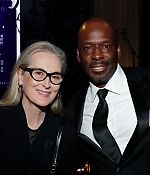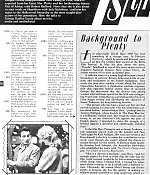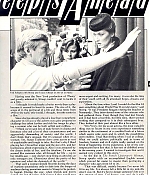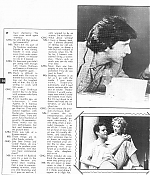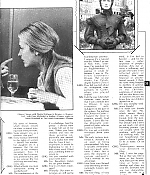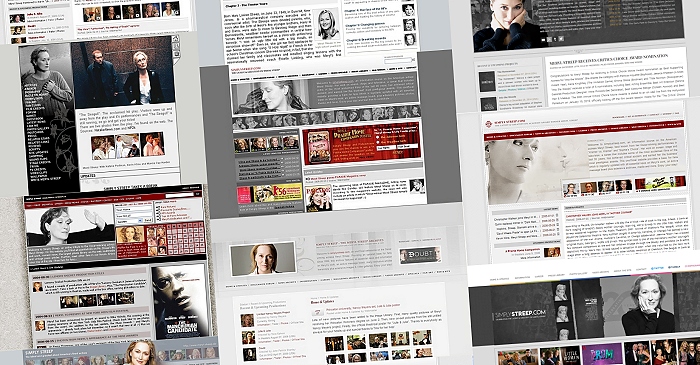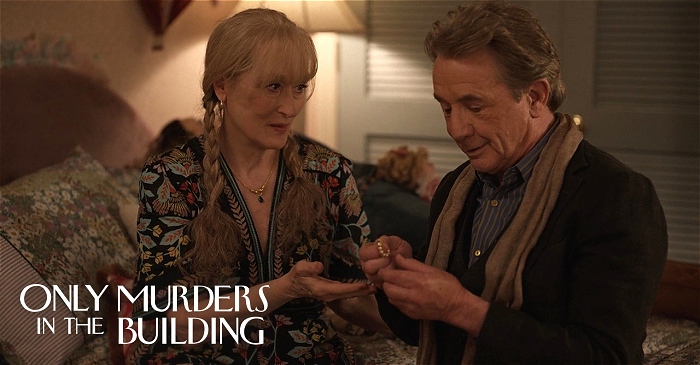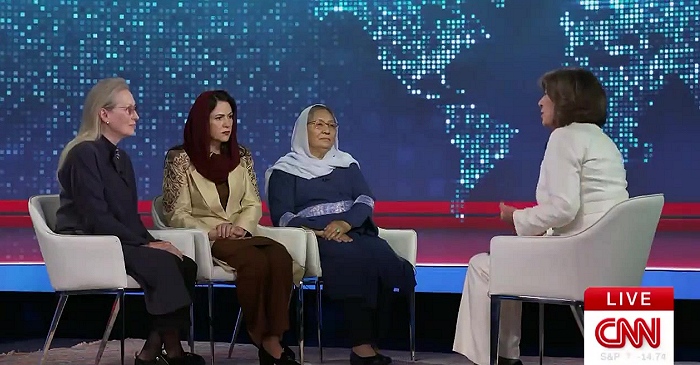
Simply Streep is your premiere source on Meryl Streep's work on film, television and in the theatre - a career that has won her three Academy Awards and
the praise to be one of the world's greatest working actresses. Created in 1999, we have built an extensive collection to discover Miss Streep's work through an
archive of press articles, photos and videos. Enjoy your stay and check back soon. |
|
Streep's Ahead
Photoplay ·
November 1985
· Written by George Hadley Garcia
|
|
Tags
|
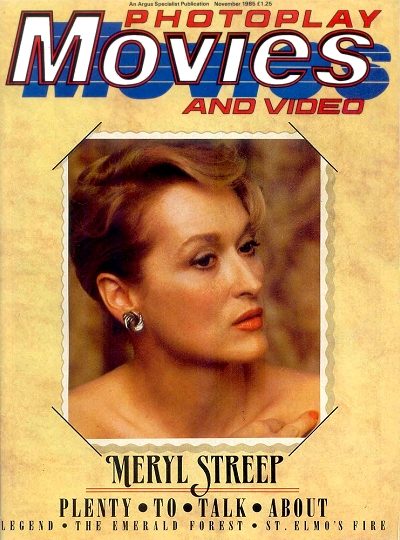
For playwright David Hare 1985 has been something of a vintage year. In February, “Wetherby”, which he wrote and directed, earned him the Golden Bear award at the Berlin Film Festival. In May his play about the press, “Pravda”, headlines as one of this year’s major works at London’s National Theatre. Now comes “Plenty”, the screen version of his most acclaimed play. It tells the story of a young Englishwoman’s mental breakdown in postwar Britain following a life of purpose and exitement in the French Resistance. David Hare wrote the play after reading a book about the Special Operations Executive, a clandestine wartime organisation that operated behind enemy lines in occupied Europe. He discovered that the divorce rate among women who had been agents for the SOE was a staggering 75 percent. Using that as a springboard for his story, Hare began writing and developing the character of Susan Traherne, his long-suffering heroine. “The person who has had a good war but can find no role in peace is a character who has often been written about before,” acknowledges Hare, “perhaps best by Terence Rattigan, whose Freddy in ‘The Deep Blue Sea’ is a brillianlty realised part. But I had the wider aim of trying to set my character’s life against the days of English plenty. I intended to show the struggle of a heroine against a deceitful and emotionally stultified class.” In the film, Meryl Streep is cast as Susan Traherne, a role originally played both on the London and New York stages by Kate Nelligan. She won rave reviews and Hare himself is the first to salute her contribution to his work, even though she wasn’t offered the chance to recreate the part for the screen. A decision made largely by director Fred Schepisi, the Australian filmmaker who established his name with “The Devil’s Playground” and “The Chant of Jimmy Blacksmith”.
“Film is a director’s medium,” says Hare, “and I’ve enough respect for Fred to think that the only way the film could succeed would be by his re-interpreting the whole thing. Since I trust Fred, I trusted his judgement about wanting to do it afresh with a different actress. Obviously the reason Meryl Streep can finance scripts is because she has the quality of making intelligent people accessible to large audiences, which is a gift given to very, very few actresses. That, I think is her quality, to make you think and feel with her.” Having seen the New York production of “Plenty” and greatly admired it, Streep couldn’t wait to tackle it as a film. “I thought it would make a better movie than a play because it seemed to burst its seams. The size of it, the scope of it, the portrayal of a life and those times from the 1945 to the early ’60s would, I thought, breathe easier in a film.” Since she has already played a less than sympathetic character in “Silkwood”, the actress was quite prepared to challenge her talent further and risk her image by playing a woman who can be both selfish and ruthless. “I think we’ve seen lots of male heroes in drama and literature and ask a lot of their circumstances and are aggressively demanding of society and the world. I don’t think that’s unusual. But its unusual when it’s a woman. Yes, Susan Traherne does come across as sort of unpalatable and tough to take. But that’s why I liked playing her. I loved her anger and the size of it, and her fearlessness about expressing it. Also I was attracted by the dream inside of her, and the idealism. To me she seemed like someone who, all through her life – up to her middle age – just doesn’t stop being as altruistic as only teenagers are. Obnoxious about the purity of her opinions and what she demands of the world.”
That such a woman should flourish during the days of wartime uncertainty only to fade into the fringes of madness during peacetime seems to Streep to be perfectly logial. During the war, when friends and lovers parted, the fact that they didn’t know if they would ever see each other again often made relationships that much more urgent and exiting. For many, it was also the time of their youth with all its attendant hopes, dreams and aspirations. “About the time when I said I would do the film I’d seen something about World War II on television,” said Streep. “It was President Reagan visiting the beaches in Normandy. They interviewed some of the veterans who had gathered there. Even though they had lost friends and it had been a horrible, horrible time, there seemed nothing that compared to it in their subsequent lives. They looked at their past almost like a love affair. On Plenty, for me as an actress, the most valuable thing was to locate in my own experiences something similiar to the excitement of a youthful look at a future which seems wide open and in which the possibilities seem endless. I had that feeling when I was at college. What we could achieve politically and in terms of freedom, human and civil rights really seemed on the brink of happening. In my experience, a lot of my contemporaries have lost that. It has sort of dribbled away in the ensuing years. I wanted to investigate that and it seemed very evident in this story.” As she did in “The French Lieutenant’s Woman”, Streep speaks with an accomplished English accent which proved far easier to master than portraying a character who ages from 18 to 36. “That was difficult, mainly because I’ve never felt 18 in my life. I’ve always felt a little bit in my mid-20s since I was 12. But it’s fun to design someone’s life over that amount of time. God knows, you can’t do it with your own.”
Interview with Meryl Streep
Currently the pre-eminent actress of America cinema, Meryl Streep’s reputation is such that she has become the leading lady to work with. Despite critical disappointment over “Falling in Love”, much is expected from her latest film “Plenty” and her forthcoming feature “Out of Africa”, with Robert Redford. News that she is also about to start work on “Heartburn” with Jack Nicholson confirms her status in the Hollywood hierachy as the most sought-after actress of her generation. Here she talks to George Hadley Garcia about movies, media and motherhood.
In Plenty, you play a French Resistance fighter during World War II. How did you relate to that period?
By reading, discussing and using my imagination. It’s not unfamiliar ground because I was in “Holocaust” and we prepared, all of us, very thoroughly for that. That’s what an actor does: prepares, then interprets, emotionally. But not always too emotionally…
Are you an emotional person?
I’m lively, I suppose. But I’m not a wheeper. I’m not overly emotional. I do like to touch – my husband, my children, friends. So I’ve evolved in that way. In part because actors tend to be very tactile and exuberant.
Acting with Redord, in Hollywood that’s about as far as an actress can go.
He’s wonderful. He wanted to work with me before on “Ordinary People”, but we waited until a mutually convenient project came up.
Will “Out of Africa” be a literary film, the kind that wins Oscars, or a commercial teaming like a new “The Way We Were”?
It will be commercial we hope! The director is Redford’s associate Sydney Pollack, who directed “Tootsie”, and the love story is the major focus, ultimately. Funny that you mentioned “The Way We Were” because that’s the kind of love story I usually prefer – something with a socially interesting background like the ’40s and ’50s.
But that a criticism of “Falling in Love”, that it had no background. It was just two people getting on and off a train.
You hear so many opinions. I don’t know. I enjoyed working with Bob again and we do have chemistry. We may even work again someday.
So why did that picture fail financially?
That’s not my part of the business, analysing. Maybe it was timing. Maybe it took place away from outer space, or a ghetto, or because no one in it danced…
It’s been said you didn’t get along well enough with Dustin Hoffman on “Kramer vs. Kramer” to work together again.
Dusty is difficult to work with. He’s said so himself that working brings out the toughest side of him. But I’d be willing to work with him again.
Is it true Hoffman doesn’t like to do films with actresses who have equal roles?
A few months ago on television, I saw “Agatha”. In it, Vanessa Redgrave’s role was bigger than his. They even danced together, with Redgrave towering above Dusty. Very few actors have that kind of security. Or generosity. Dusty works for his own performance, but first and foremost for the picture itself.
There was talk of a “Kramer” sequel.
Those things are in other hands, entirely.
Like Jane Fonda and Goldie Hawn, do you intend to produce your own pictures, now that you have commercial clout?
Is it worth it? Redford says it’s a pain in the fanny, because you spend years reading, then a year in commissioning re-writes, then you seek financing, and so it goes on and on. I only wanted to be an actress. I’m no banker!
What about writing?
I have a literary bent, yes. I always dreamed of editing my old college paper, or doing a thin but rich volume of memoirs when I’m 70. So far, I haven’t considered doing a screenplay. There’s only so much you can do with your time.
More than one biography of you has been published. How do you react to them?
Reading reviews is as far as I go with the media. I give interviews, hopefully judiciously, and I read movie reviews after the fact of course. Theatre reviews I would sometimes read while I could still benefit from them. But I’m not about to sit down and read my interviews, or any book about me.
Do you resent the invasion of privacy then?
I resent the re-interpretation, which the reader usually accepts uncritically. It’s one thing when a journalist interprets – as we all do – how I am for an hour or two, one on one. It’s totally different, and disturbing, when someone tries to categorize and translate your entire life to date, even pointing out your future as a mother, actress, wife, daughter and so on.
What mistake do you think the writers make when they portray you?
My pet peeve in interviews is that I come across as So Serious. As if I think everything I appear in is High Art. My sense of humor, which friends remark on often, is almost missing from these portraits.
Some present you as a feminist. Are you?
Every woman interested in the rights of women – herself, her mother, her daughter etc is a feminist. But I’m not active in the women’s movement. Sure I’d like to be, but I’m an actress professionally, and in my private life two kids keep me very busy, every day.
Which affords you most satisfaction: acting or motherhood?
The combination of the two. I like a hectic life. It’s a challenge. And I’m greedy. I always want to make full use of my time. When you have children and you see them growing up, physically and mentally, you realise how time slips by, how it just… evaporates. It would be frightening to me if I didn’t have work I liked and a fulfilling home to return to.
Are you satisfied with your name now?
Yes. Repetition makes the ear grow fonder!
You’re of Dutch origin, right?
Primarily. But some interviews are still saying I’m Norwegian or of Scandinavian ancestry. I suppose it’s a natural mistake. When I go out in New York, sometimes I’m mistaken for an Englishwoman. I suppose it could be because I was in “The French Lieutenant’s Woman”. But no one thinks I’m Polish, despite “Sophie’s Choice”.
How did you feel about the widespread comparisons to Garbo when you played Sophie?
I felt the way I did when someone wrote that I was the female heir to Olivier. It was somewhat self-indulgent on the part of the writers. I’m nothing like Olivier or Garbo – I haven’t the nerve to compare myself. God knows, I don’t like being physcially compared to Garbo, who on screen is flawless.
Do you get comments nowadays about your nose?
The early reviews mentioned it. Acutally, it’s an asset in being photographed. My face is variable. Sometimes I look very good, sometimes I don’t, but it gives the character a certain ambiguity. That’s worked to my advantage.
How have you changed since becoming an internationally known performer?
The first thing, of many that spring to my mind is I’ve become – and for the first time – rather suspicious of people’s motives. Any star attracts a following and people who want, if not reflected glory or notoriety, then some financial or psychological reward. I think the same thing happens to mothers in general; we become protective of our children, suspicious of strangers, and we take better care of ourselves because we know how our children depend on us.
Do you socialize with many friends?
I’ve made few friends since the ’70s, which means there’s time for a few real friends from the past, from college and since. But Donald and I don’t go out much, not since becoming parents. I go out socially when I’m working, with people I’m working with. I’m not housebound, but given a choice I prefer to be at home. Or on location.
Theatregoers mourn your defection to films…
Well, I miss the stage. But as they say, film is more or less forever. And films give me more time at home, to develop and share my own life. Extended runs are too demanding unless the role is a mother.
 Released August 27, 2024 Meryl Streep returned as Loretta Durkin for the fourth season of Hulu's "Only Murders in the Building", starring Steve Martin, Martin Short, Selena Gomez, and guest-starring Eugene Levy, Eva Longoria & Melissa McCarthy. |


Posted on November 17th, 2024
|
Posted on November 7th, 2024
|
Posted on November 1st, 2024
|
Posted on October 10th, 2024
|
Posted on September 26th, 2024
|


